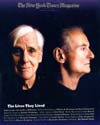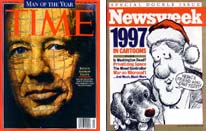0

New York Times Magazine, Jan. 4
(posted Wednesday, Dec. 31)
The Times Magazine buries 1997 with a special issue celebrating the notables who died this year. Leo Rosten's Yiddish dictionary helped boomers understand the "world of our mothers and fathers." Kurt Vonnegut Jr. chronicles the life of his brother, Bernard, a physical chemist who discovered cloud-seeding. The Times art critic uses the deaths of Willem de Kooning, Roy Lichtenstein, Victor Vasarely, and Dora Maar as a peg for an essay on the fickleness of the art canon. "Forever 19" TV programmer Brandon Tartikoff wanted nothing more than to be in the TV set: "I thought that would be the ideal existence." Pop prodigy turned recluse Laura Nyro is remembered for her lasting impact on other female independents. Other eminencies included in the issue: Curt Flood; Ben Hogan, a bat scholar; Albert Shanker; Murray Kempton; Chicago Defender publisher John H. Sengstacke; and four top-flight astronomers. And did you know that the inventors of the M-16, the ATM, the yield sign, and track lighting expired this year?

The New Yorker, Jan. 5
(posted Tuesday, Dec. 30)
An article chronicles the troubled pregnancy of Karen Santorum, wife of partial-birth-abortion foe Sen. Rick Santorum, R-Pa., and the evolution of the senator's views on the procedure. A birth defect threatened the lives of both fetus and mother, forcing the couple to face the ethical question of whether or not to abort to save her life. Premature labor made the quandary moot--the baby died two hours after birth--but stiffened their resolve against late-term abortion. (A "Strange Bedfellow" bashes Santorum's "pathetic grandstanding.") Robert A. Caro recounts the travails of writing his book The Power Broker, about New York public builder Robert Moses. The autocrat consented to interviews--actually monologues--until Caro asked a tactful question about political payoffs. Moses terminated the interview, never spoke to Caro again, and warred against the book. An article about casual window-peeping in New York revels in the joys of watching your neighbors exercise, read, eat, and screw, and asks why people don't draw their curtains.

Mother Jones, January 1998
(posted Tuesday, Dec. 30)
The magazine's cover package takes on Microsoft. Bill Gates "pulls strings" in Washington and other world capitals, "cheats" by coercing software pirates into signing deals with the company, and "lies" about his business intentions, the magazine says. One article doubts that the government or any competitor can curb Microsoft, another alleges that the company intends to compile dossiers on all PC users, and a third reports on how the ad firm of Wieden & Kennedy transformed Microsoft's image from nerdy to cool. An article calls for cleaving 25 new states out of the nation's most populous states to restore representative democracy to the U.S. Senate.

Time and Newsweek, Dec. 29 and Jan. 5
(posted Tuesday, Dec. 23)
Time picks Intel CEO Andrew Grove as its Man of the Year because microchips are integral to our economy, and Grove's paranoid business style has kept Intel first in the industry. Grove lived through World War II as a Jew in Budapest, escaped Hungary when the Soviets took over, excelled in an American college despite barely speaking English, and overcame prostate cancer and severe hearing loss. (Average Joe fact: Grove's office is a tiny cubicle just like Intel's lowliest programmers use.) An accompanying piece explains how microchips work. Time's runners-up: Alan Greenspan, Princess Di, philanthropist Charles Feeney, and sheep cloner Ian Wilmut. (Click here to read about Slate's Man of the Year.)
Newsweek presents the year in cartoons. (A man and woman are in bed. Man: "Politicians, Hollywood stars, military personnel ... Seems like everybody's sleeping around." Woman: "You sound just like my husband.")
Time names its best and worst of 1997. Winners: the Guggenheim at Bilbao, L.A. Confidential, and Volkswagen's "Da Da Da" ad. Losers: celebrity-authored books, ER's live episode, and Robin Williams.
Newsweek assesses the future of commercial space travel. Civilian flights are coming in the next century, and soon, the companies promise, they'll mine asteroids for gold and ship packages from Los Angeles to Tokyo, via orbit, in 45 minutes. Newsweek also wonders if the neurotransmitter serotonin is the key to life. Serotonin, the magic behind Prozac, fen-phen, and Saint Johnswort, may bring "happiness, high social status and a nice, flat stomach."

U.S. News & World Report, Dec. 29 and Jan. 5
(posted Tuesday, Dec. 23)
Its year-ender offers 16 "Smart Ideas to Fix the World." Among them: Tax fatty foods to help Americans slim down, filter Chesapeake Bay with billions of silt-eating oysters, put public schools in large workplaces, and fire Monday Night Football's commentators. Also, a week after Time and Newsweek, U.S. News runs an inferior year-end photo package. An article mourns the 1997 deaths of some lesser-known heroes: the inventor of the yield sign and the original Hamburglar, among others.

Weekly Standard, Dec. 29 and Jan. 5
(posted Tuesday, Dec. 23)
Miss America 1944, Venus Ramey, chastises Miss America 1998, Kate Shindle, for pushing condom distribution in schools as an AIDS-prevention measure. Ramey's "open letter"--"from an old bathing-suit bimbo to a young one"--sasses Shindle for assuming that she's now a public-policy expert: "Does winning a college scholarship with the bod suddenly make one all-knowing? ... I also come from an era when we had a name for girls who hand out condoms, and it wasn't Miss America." An article contends that Russia is faring much better than experts say it is. Crime has been falling for several years, most of the economy is privatized, and real reformers like Yegor Gaidar have made headway against fake reformers like Boris Berezovsky.
--Seth Stevenson
